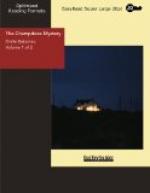One evening he entered the Cafe Castille. He found a large number of students collected there, and was a little disgusted at their turbulent gayety, and, hastily withdrawing, he spent the rest of the weary evening in his own rooms with Bruno, who, for his part, would have much preferred the open country. He had really only enjoyed the four evenings on which he had visited the Martre; but these limited hours of happiness did not make up for the web of falsehood in which he had enmeshed himself, or the daily dread of detection in which he lived.
The Duke had noticed his son’s absence, but his suspicions were very wide of the truth. One morning he laughed at Norbert on the continued non-success of his shooting.
“Do your best to-day, my boy,” said he, “and try and bring home some game, for we shall have a guest to dinner.”
“To dinner, here?”
“Yes,” answered the Duke suppressing a smile. “Yes, actually here; M. Puymandour is coming, and the dining-room must be opened and put into proper order.”
“I will try and kill some game,” answered Norbert to himself as he started on his errand.
This, however, was more easily resolved on than executed. At last he caught sight of an impudent rabbit near a hedge; he raised his gun and fired. A shriek of anguish followed the report, and Bruno dashed into the hedge, barking furiously.
CHAPTER V.
A bad start.
Diana de Laurebourg was a strange compound; under an appearance of the most artless simplicity she concealed an iron will, and had hidden from every one of her family, and even from her most intimate friends, her firm resolve to become the Duchess of Champdoce. All her rambles in the neighborhood had turned out of no avail; and as the weather was now very uncertain, it seemed as if her long strolls in the country roads and fields would soon come to an end. “The day must eventually come,” murmured she, “when this invisible prince must make his appearance.” And at last the long-expected day arrived.




